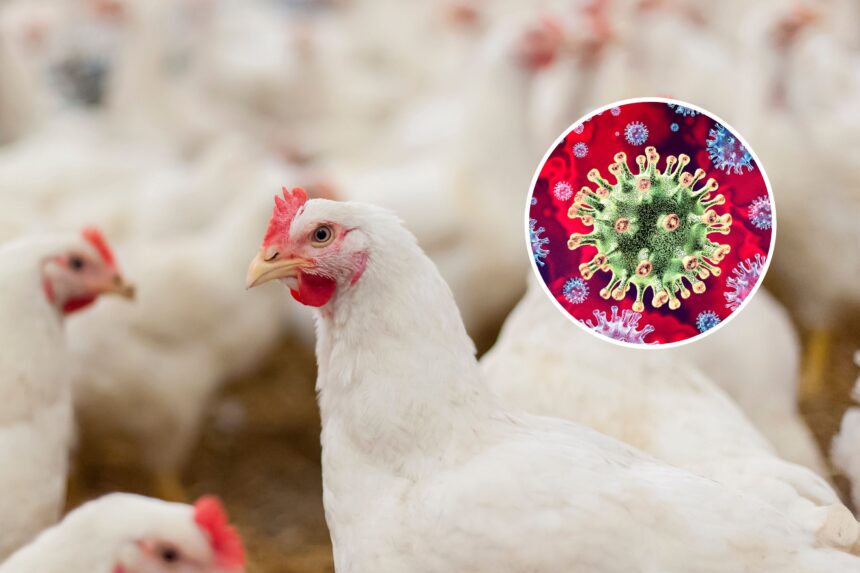Four egg farm workers in Washington state have tested “suspected positive” for bird flu.
This suspected outbreak in Franklin County marks the first time highly pathogenic H5N1 avian influenza has been detected in humans in Washington. It is now the sixth US state where humans have tested positive for this highly contagious strain of the virus.
About 800,000 chickens at the same farm were culled after the Washington State Department of Agriculture discovered they were infected with bird flu on October 15.
Workers at the farm were later tested, resulting in four “presumptive positive” tests for the virus, the Washington State Department of Health said.
“Washington has been closely monitoring the spread of H5N1 since it was first detected in poultry in the state in 2022, and our country is prepared with the knowledge, relationships, and tools to minimize its impact on our communities,” Washington Health Secretary Umair Shah said. said in a statement Washington State Department of Health.
Is Bird Flu H5N1?
Bird flu, also known as bird flu, refers to the influenza virus that primarily infects birds but can sometimes spread to other animals, including humans. There are several subtypes, but the most famous strain affecting humans is H5N1.
Bird flu viruses are divided into two categories: low pathogenic avian influenza (LPAI) and high pathogenic avian influenza (HPAI). H5N1 is an HPAI that causes severe disease and high mortality rates in birds.
“Avian influenza A(H7N9) viruses and the highly pathogenic avian influenza (HPAI) A(H5N1) and A(H5N6) viruses have been responsible for most human disease from avian influenza viruses reported worldwide to date, including the most serious with a high mortality rate,” the CDC explains.
There have been outbreaks of H5N1 bird flu in wild birds around the world in recent months. More than 100 million domestic birds in 48 US states and dairy cows in 14 states. affected.

ISTOCK / GETTY PLUS IMAGES
“Highly pathogenic H5N1 avian influenza (HPAI) has caused multistate outbreaks in poultry, dairy cattle, and wildlife,” the Washington Department of Health said.
“Avian influenza is a disease caused by the type A influenza virus that occurs naturally in wild aquatic birds around the world. The H5N1 virus can also infect other bird species, and occasionally mammals, and can cause significant mortality in poultry species, such as chickens. , turkey, pheasant, quail, duck, goose, or guinea fowl.”
How many people have caught H5N1?
H5N1 cases in humans are rare but can occur through close contact with infected birds or surfaces contaminated with the virus. It does not spread easily from person to person.
“On rare occasions, the bird flu virus infects people and makes them sick. Most cases of people becoming infected with bird flu have occurred after prolonged and close contact with animals infected with bird flu or environments contaminated with bird flu,” the State Department said. Washington section. Health said.

CDC
Before the Washington farm workers, The CDC has reported 27 cases of H5N1 bird flu in humans in the US this year, 16 of which have been confirmed as H5N1..
Thirteen of the cases were reported in California, 10 in Colorado, two in Michigan, and one each in Missouri and Texas. One additional case was previously detected in a poultry worker in Colorado in 2022.
“CDC believes the current risk to the general public from avian influenza viruses is low,” the CDC said. “The spread of bird flu virus from one infected person to close contacts is rare, and when it does occur, it does not cause spread between people.”
Bird Flu Symptoms in Humans
Bird flu symptoms in humans include typical flu-like symptoms, such as conjunctivitis, fever, cough, sore throat, runny nose, muscle aches, headache and fatigue.
In some cases, the infection can lead to more severe conditions such as pneumonia, multi-organ failure, and even death. H5N1 bird flu was previously found to have a high mortality rate about 50 percent in humans.
The Franklin County farm worker was found to have only mild symptoms and has been treated with antiviral drugs.
“Testing of additional individuals at the farm is currently pending and the number of cases under investigation may change,” the Washington State Department of Health said.
“(Washington State Department of Health) and (Benton-Frankin Health District) have been providing personal protective equipment to farm workers, monitoring exposed workers for symptoms of avian flu, and providing testing, vaccines, and treatment to workers who have symptoms.”
Do you have a tip on the story of science Newsweek should cover? Do you have questions about bird flu? Let us know via science@newsweek.com.




